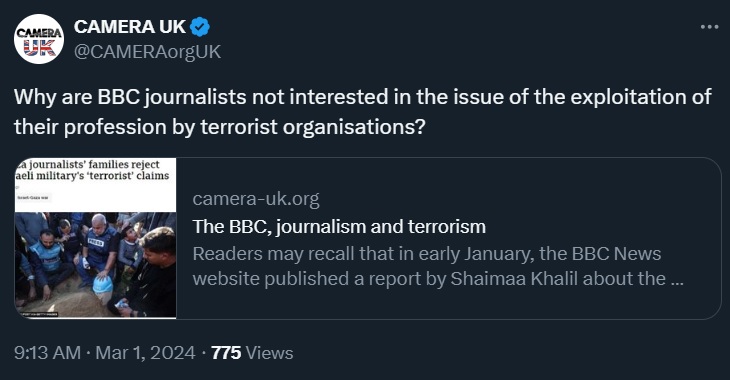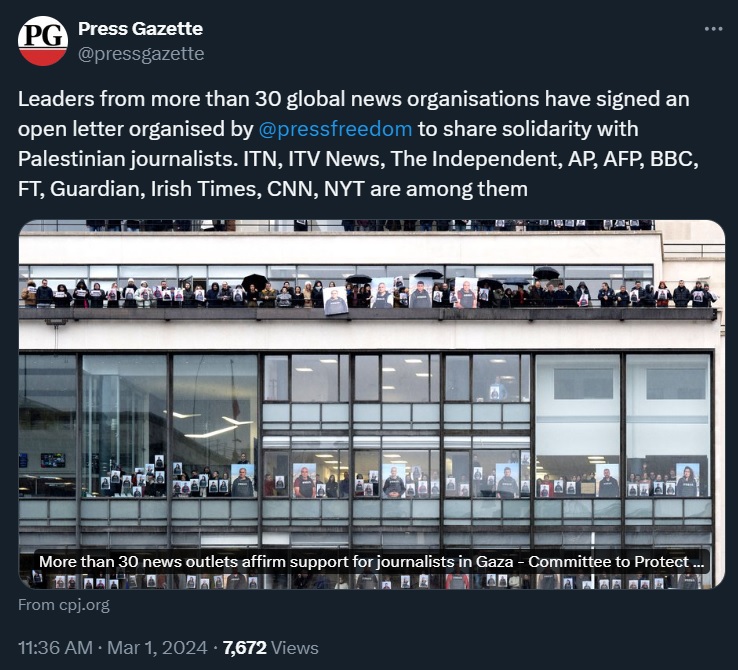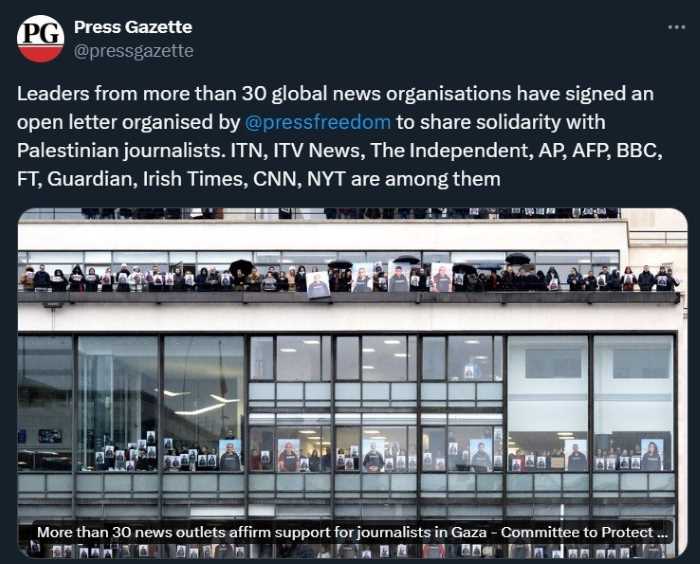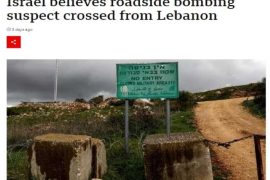On the morning of March 1st we asked a question:

As we noted in our post, the ITIC recently published a report showing that over 50% of the journalists that the Hamas media office says were killed in the Gaza Strip between October 7th 2023 and February 18th 2024 were affiliated with terrorist organisations, including 44 from Hamas and 19 from the Palestinian Islamic Jihad.
THE BBC, JOURNALISM AND TERRORISM
“As we have previously observed in relation to BBC coverage of the topic, the safety of journalists while doing their job is of course an important issue. So too is the abuse of journalism and journalists by terrorist organisations and repressive regimes.
The blurred lines between journalism and terrorism in the Gaza Strip have long been on record but the BBC nevertheless has to date shown no interest in denouncing the exploitation of journalism by cynical terrorist organisations or in drawing a line between legitimate media organisations and those promoting the interests of terrorist organisations or terror funding regimes.”
Little did we know that the answer to our question had already been provided.

The CPJ’s “open letter” reads as follows:
“We, the undersigned, stand united with Palestinian journalists in their call for safety, protection, and the freedom to report.
For nearly five months, journalists and media workers in Gaza – overwhelmingly, the sole source of on-the-ground reporting from within the Palestinian territory – have been working in unprecedented conditions: at least 89 have been killed in the war, according to the Committee to Protect Journalists, more journalists than have ever been killed in a single country over an entire year.
These journalists – on whom the international news media and the international community rely for information about the situation inside Gaza – continue to report despite grave personal risk. They continue despite the loss of family, friends, and colleagues, the destruction of homes and offices, constant displacement, communications blackouts, and shortages of food and fuel.
Journalists are civilians and Israeli authorities must protect journalists as noncombatants according to international law. Those responsible for any violations of that longstanding protection should be held accountable. Attacks on journalists are also attacks on truth. We commit to championing the safety of journalists in Gaza, which is fundamental for the protection of press freedom everywhere.”
In the Gaza Strip, however, not all “journalists are civilians”. Some – like the two whose terror links the BBC tried to downplay in January – are active members of terrorist organisations. Others are employees of the media arms of terrorist organisations. Obfuscating that fact clearly does nothing “for the protection of press freedom”.
Nevertheless, one of the people who chose to sign the CPJ’s “open letter” is Deborah Turness, the CEO of BBC News. Readers may recall that in October of last year, Turness attempted to do damage control following criticism of BBC coverage of the war initiated by Hamas on October 7th.
However, as we see, Turness’ commitment to providing BBC audiences with “trusted journalism” does not include recognition of the fact that her profession is being abused by people who function both as journalists and terror operatives.
The BBC’s participation in this CPJ campaign, which whitewashes the issue of the terror affiliations of some journalists in the Gaza Strip, is particularly relevant given that – as noted by Jeremy Bowen in a recent Radio 4 item – the corporation is currently using local freelancers to produce content.
Bowen: “The only journalists in Gaza at the moment are Palestinians who were there on the 7th of October and haven’t left. Many Palestinian journalists have been killed. Many others, including my colleagues from our BBC office in Gaza, have got out with their families. The ones left behind, whether by choice or because they haven’t had permission to cross into Egypt, are extremely courageous. We work with freelancers inside Gaza who liaise with a talented young Palestinian producer in our office in Jerusalem. […] We would be precisely nowhere without them.”
Indeed, BBC audiences have seen reports from the Gaza Strip that are credited to journalists who are not present on the ground but fail to clarify who actually did the filming and interviewing.
With the BBC now having made it clear by means of Turness’ endorsement of this CPJ letter that the issue of journalists engaging in terrorism is not one of its concerns, some difficult questions obviously arise regarding Turness’ claim to provide “trusted journalism” to the corporation’s funding public.
Related Articles:
BBC JERUSALEM BUREAU DOES CHURNALISM FOR CPJ REPORT
THE BBC’S OWN RECORD DEBUNKS JEREMY BOWEN’S ‘FREE ACCESS’ CLAIMS






Stop the public funding and kick out all the pro Arab staff – there will be very few eft in the news/opinion room!